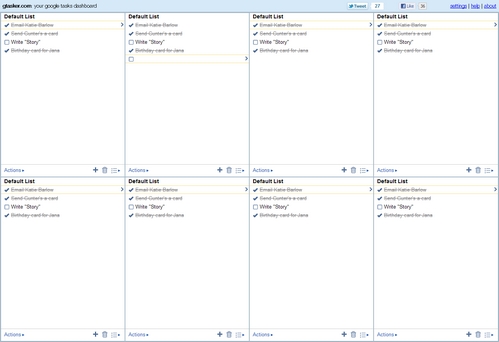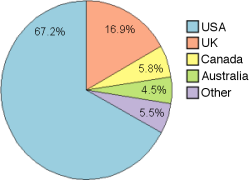A nice interface for Google Tasks: Gtasker.com

Time Tracking Software Reviews
The best time tracking software reviews and methods
A nice interface for Google Tasks: Gtasker.com

Help for teachers to balance their work and private lives. How to organize to-do lists, paperwork and time to best help teachers get more done.
Mike Rowe on jobs and working.

…[P]ie charts are really only useful when a small number of categories of data are far, far greater than others.
The above example is useful. From John Graham-Cumming’s post about pie charts.
How do people spend their time?
MARGARET THATCHER, a former British prime minister, reportedly got by on just four hours’ sleep a night. Such deprivation would trouble many people, and certainly the French, who sleep for nearly nine hours on average, according to a report by the OECD. True to stereotype, the French also spend the most time eating and drinking of OECD members—indeed, they eat for almost twice as long as the Americans. The Japanese appear to have a tough time of it, working by far the longest hours. However, they also devote less time to unpaid work such as household chores and childcare, activities that account for around one third of the OECD’s GDP.
I tell myself that I will merely write down the steps needed to complete the task. Just a rough draft, at first, and that’s it. Maybe just 3 steps. I then add more steps, breaking the 3 steps into smaller sub-tasks. I then add some details, and thoughts, notes of things that I shouldn’t forget when doing this task. I just think the task through and write everything down. After a little while, I will be a proud author of “The Complete Guide To Finishing Task X for Dummies”.
Watch Ricardo Semler give a talk about “Leading by Omission.”
“Every one of us can send emails on Sunday night, but how many of us know how to go to the movies on Monday afternoon? If you don’t know how to go to the movies from 2 to 4, you’re in trouble because you’ve just taken on something that unbalances life, but you haven’t rebalanced it with something else.” — Ricardo Semler
A few years ago I read the book Maverick by this man, and it was really good and got me thinking about a lot of topics.
About the Lecture — If successful business depends on innovation, wonders Ricardo Semler, why are automobiles made essentially the same way today as they were in Ford’s first assembly line 100 years ago? Parallel parking is one of “ the stupidest things we do,” says Semler, “If we had a day, could we not by tomorrow afternoon figure out a way to make a car” that handles better in this common situation — or, on a grander scale, escape from the “silly concept” of oil dependent transportation altogether? The problem, Semler figures, is that there’s “something fundamental about organizations and … leadership that makes it almost impossible for people inside a business to change their own industry.” Industries are based on “formats that are basically legacies of military hierarchies,” says Semler, which neglect or deny the power of human intuition and democratic participation. In Semler’s own firm, there are no five-year business plans (which he views as wishful thinking), but rather “a rolling rationale about numbers.” A project takes off only if a critical mass of employees decides to get involved. Staff determine when they need a leader, and then choose their own bosses in a process akin to courtship, says Semler, resulting in a corporate turnover rate of 2% over 25 years. “We’ll send our sons anywhere in the world to die for democracy,” says Semler, but don’t seem to apply the concept to the workplace. This is a tragic error, because “people on their own developing their own solutions will develop something different.
Interesting TEDxBoulder video with Grant Blakeman. He advocates minimalism for a better, full, life.
Interesting read: What Procrastination Looks Like
Every day we’ll email you to ask, “What’d you get done today?”
Inch by inch, anything’s a cinch.
We’ll keep a calendar for you of what you got done. Look to your streak from yesterday to motivate you today.
Represents time as a hexadecimal colour value. From our friends across the pond.
And here’s a whole discussion about how it could have been built in HTML5.
Crazy cool clock to bring to meetings to show everybody how much time and money they are wasting (potentially) by being in that meeting.
I’d wager that meetings ARE necessary to get business done. Not all of them are critical. In my honest opinion, I feel like most of the ones I partake in are needed, and worth the time.
Benjamin Franklin gives us this:

From this interesting post about time lapse videos.
Ask yourself three sets of questions:
- How did the day go? What success did I experience? What challenges did I endure?
- What did I learn today? About myself? About others? What do I plan to do — differently or the same — tomorrow?
- Who did I interact with? Anyone I need to update? Thank? Ask a question? Share feedback?
Source: The Best Way to Use the Last Five Minutes of Your Day over at Harvard Business Review.
Neat post: Four creative calendars… check it out.
Sweet visual 2011 calendar (via Kent):